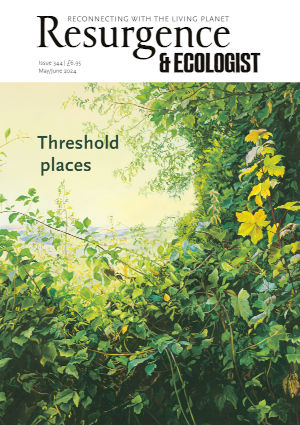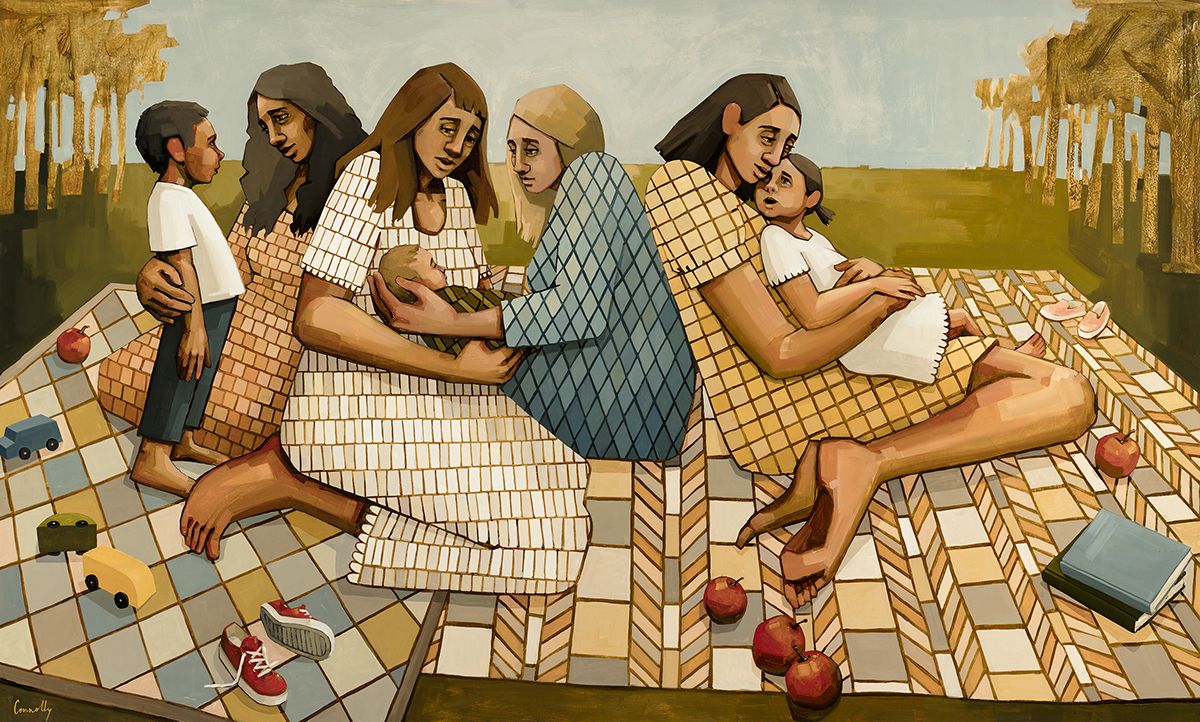I am standing in the doorway of my house deciding whether to turn left or right on the lane outside. The decision is not really about direction, though – it is about who I was, and who I am being invited to become. Turning left – as I always did before I gave birth to my daughter – takes me up the lane, out of the village, towards views and expanse. Living in mid Devon, with its green lose-yourself valleys and little hills and heavy rain, expanse can feel hard to come by and I crave the space, the lightness, the wind that outlines my solitary edges. Turning right takes me down the hill, past cottages and the pub, past the village hall, which bears traces of what community has meant to this place. I step outside, close the door, and turn right. I turn to the village because I am trying to find the literal and figurative one that it will supposedly take to raise my daughter.
My husband and I moved to this village because of affordability, not roots. We are investing in community, but I have felt lonely in this time of ‘matrescence’ – the process of becoming a mother. I speak to other mothers who feel the same.
Until the industrial age, children were raised in community, with siblings, cousins, grandparents, aunts and neighbours often caring for newborns and new mothers. In her book Mothers and Others: The Evolutionary Origins of Mutual Understanding, anthropologist Sarah Blaffer Hrdy makes the case that since the Pleistocene it really has taken a village to raise a child. Our ancestors of the taxonomic subfamily Homininae developed an ability and need to care and cooperate in a way that others didn’t. We are here today because we cared about each other.
But the nature of caregiving, of community, has changed. We generally no longer live amongst family and friends, more emphasis is placed on individualism, and ‘third spaces’ conducive to communal life such as libraries and parks are closing down. It can be easier to pay for help than to ask for it.
Before giving birth, I read books that gave advice based on the mother-baby dyad, never the village. I go to baby groups and am grateful for the connection, but all of us there are exhausted. My husband loves spending time with our daughter, but he does the lion’s share of paid work, so it’s me and her most days. I am trying to work and write around the edges, to remember my shape, but we need help. I need help, and so I am seeking my own village.
I am confronted by this need for a village, because although I have worked with communities and represented them internationally through charities and locally through politics, I’m not sure I’ve ever been deeply immersed in one. I have declined so many invitations to belong – by moving, by neglect, by fear.
Community is necessarily challenging, but it is also a gift. Motherhood asks me to receive that gift, to step into the village – this literal one, and the wider figurative one – rather than watch from the edge. It asks me to cross from independence to interdependence, to a new way of being. I want my daughter to know who her neighbour is, and how to love and be loved by them even when they are nothing like her. I want to know this for myself, too.
There are clues here about love: neighbours help with jobs without us even asking; church members brought us meals after I gave birth; there’s a youth club run by tired volunteers who make sure children have somewhere to belong on a Friday night. Love is everywhere and generous: hedgerows brim with blackberries, blackberries bubble into jams, jams sell to raise money for the food bank, the food bank (alarmingly) feeds the farmer who tends the hedgerow; life forever giving-receiving-giving-receiving. It’s a love that appears unremarkable, mud-stained, mundane. It is patient, particular, place-based, and asks me to be the same; to arrive at the ground and relationships beneath my feet and choose to stay.
The love needed for village-building is here. What’s missing is the social and practical infrastructure to support it, the recognition that children and mothers and all of us wither if the village does. Spaces to build communal life are dwindling, policies and funding that support care and community are pared back while the cost of living goes up.
I have friends scattered geographically and online; these relationships are an important part of my wider supportive ‘village’, but still reclamation of place-based community feels essential. I’ve seen its power particularly in my work across Africa; it is, as author-farmer Wendell Berry says, “a commonwealth: a place, a resource, and an economy. It answers the needs, practical as well as social and spiritual, of its members.”
The village pushes back against messaging that praises western individualism and tells us we can do it all alone – after two decades of work with communities, it has taken motherhood to make me realise I can’t, and it is taking the fragmentation of communities to make me realise what we’re collectively losing. Now I want to understand and reclaim the ecologies of care we were all once rooted in.
We stand outside, my daughter and me. A breeze blows through the village, through other lives, and now embraces the shape of us too. I see dark clouds approaching over Dartmoor, and I am struck by the frontier between clear sky and approaching storm, between light and dark, between what has been and what is becoming. We go back inside to the intimacy of a crib, and I think how this love, this motherhood, can seem mundane. But the word ‘mundane’, I have learned, is rooted in the Latin mundanus – ‘belonging to the world’ – and this is what motherhood invites me to transition into, what it asks that we reclaim: communality, interdependence, belonging somewhere in this brutal, beautiful world.








